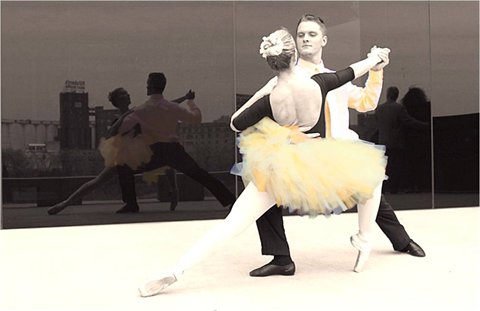FRINGE SHORTS: “Ballet Amore” by Cities’ Classical Dance Ensemble
Lightsey Darst weighs in on a show by the Twin Cities newest ballet company, "Ballet Amore:" she says it's an ably executed crowdpleaser, the sort that makes for a nice introduction to the form, if you're new to ballet.

FOR SOME TIME NOW, MINNEAPOLIS HAS HAD A SURFEIT of ballet dancers, more than our two chamber ballets can use. These people go to class faithfully and dance well, but they don’t get many opportunities to perform. Now some of them have banded together as the Cities’ Classical Dance Ensemble, presenting their first production, Ballet Amore, at the Fringe. It’s nice to see them on stage — they all look so happy. But I don’t mean it’s merely nice for them. Musical, confident, graceful, strong, they’re worth seeing. The men especially are a surprise — who knew you could hide male ballet dancers like this in a ballet scene this small? The pool must be deeper than I thought. Swimming, anyone?
Ballet Amore offers a mixed bill: seven pieces, plus a live musical interlude (any dance performance with live music gets an extra star), all in under an hour. If you want to introduce someone to ballet, this wouldn’t be a bad place to start. The company co-founders, Katherine Krieser and Laura Janson, contribute light, pleasant pieces — Krieser’s is more driven by music and classical ballet vocabulary, while Janson’s is more experimental in its approach to the steps. The Olympian men of Ronn Tice’s short, moody “Prometheus” stride and tussle while a bevy of nymphs flit and worry; Riley Thomas Weber is especially notable here as the angry whirlwind of Zeus. Alexander Smirnov makes not-too-sweet love to the audience in his own “Tango Para un Hombre”. The piece doesn’t quite connect its dots (I wish the device of the beating heart had more visibly continued through), but Smirnov knows himself, and he makes the most of his razorwire arms and bravura jumps.
For more testosterone thrills, Smirnov and Luke Tucker sail through a couple of Jacques Brel songs choreographed by the Belgian Ben Van Cauwenbergh. In the solo “Les Bourgeois,” Tucker makes like a drunken Baryshnikov, which is to say, still appealing, still a pretty good dancer, and very funny. Requisite indoctrination of the next generation appears in the form of a Pas de Quatre (one of ballet’s Romantic-period chestnuts) performed by four little girls with such a terrifying command of ballet’s flirty épaulement, its treacle smiles, faux-hauteur, and fetching moues, that they will undoubtedly wreak havoc when they get a little older, if they are not doing so already.
Colleen Tague makes her dancers look good with a piece of classic suspenders-and-white-tees jazz, and they return the favor. The surprise here is Yuki Tokuda. Sometimes in ballet she can look a bit of a goody-two-shoes, but under the influence of jazz’s syncopation, she lets out a mischievous spirit that likes to break rules, be off-balance, sway.
The keynote of this performance might be its finale, where instead of processing out in a tired and dignified fashion, the dancers come on still dancing (or, in Joe Bueno’s case, still back-flipping). Even after the bows are over, Amy Pennaz is still dancing away, smiling to find herself midair.
______________________________________________________
Related performance details:
Ballet Amore by Cities’ Classical Dance Ensemble is on stage at the Lab Theater in Minneapolis. Remaining shows are Friday, 8/12 (4 pm); Saturday, 8/13 (8:30 pm).
Check back regularly throughout the Fringe Festival for more short reviews on mnartists.org, sent in from our intrepid performance critics on the scene
______________________________________________________
About the author: Originally from Tallahassee, Lightsey Darst is a poet, dance writer, and adjunct instructor at various Twin Cities colleges. Her manuscript Find the Girl was recently published by Coffee House; she has also been awarded a 2007 NEA Fellowship. She hosts the writing salon, “The Works.”